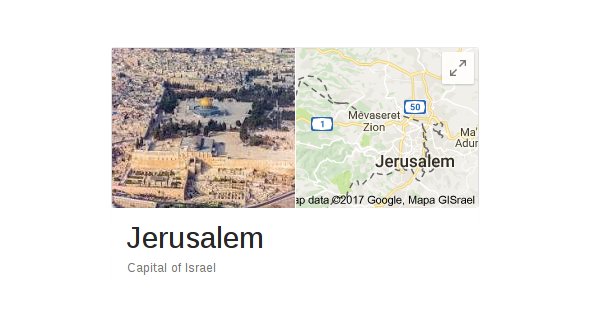An ‘Informational Right to the City’?

Google search results for 'Jerusalem’ display an infobox controversially declaring the city to be the ‘Capital of Israel’.
What rights do citizens have, not just to public and private spaces, but to their digital equivalents? Mark Graham and Joe Shaw ask.
When you type the word ‘Jerusalem’ into Google, it is likely that you’ll be shown an infobox declaring the city to be the ‘Capital of Israel’. The problem is that the state of Israel is the only country on earth to recognize the city as Israel’s capital. Many Palestinians consider the city to be the capital of the Palestinian state. But the rest of the world either explicitly states that the city isn’t a capital, or refuses to take a position on the issue.
This is but one example of how code and databases that are deployed by a search engine can help to define what a place is. Contemporary cities are much more than bricks and mortar; streets and pipes. They are also their digital presences – abstract presences which can reproduce and change our material reality. If you accept this premise, then we need to ask important questions about what rights citizens have to not just public and private spaces, but also their digital equivalents.
In 1968, long before our digitally-augmented cities were ever enabled by the likes of Google, the French philosopher Henri Lefebvre outlined what he referred to as a ‘right to the city.’ This was a vision that everyone should be able to get the most out of living in cities, not just the powerful elites and large corporations that own and control so much of them. This emphasis on reclaiming a more egalitarian and inclusive city was aimed at the traditional mediators and drivers of urban politics and inequality – landlords, the state and the police.
Advert
Whilst the ‘right to the city’ was never intended to be pre-defined as a list of codified laws, its embodiment as a slogan against exclusion has resulted in all sorts of shared benefits for urban citizens around the world: It has been used to frame struggles for access to clean water in South America, to sanitation in India, for new rent control laws in Berlin, and for battles for displacement compensation in South Africa. It doesn't always work, but in the right hands it can serve as a powerful conceptual weapon for the collective good – it can represent the right to change ourselves by changing the city.
But, if our cities are digital as well as material, then shouldn’t the struggle for more egalitarian rights to the city move beyond a focus on material spaces and into the realm of digital ones?
Of most concern is the fact that corporate giants like Google mediate a vast amount of information about our cities. If you search for a coffee shop close to you, the results that the search engine gives back to you can end up shaping what you do, where you go, and how you end up spending money. This, in turn, can reshape our cities themselves: privileging some people, places, and organizations and sidelining others.
There are many who undoubtedly find the idea of one unaccountable company playing such a dominant role in everyday urban life problematic. And this is where a return to the vision of ‘a right to the city’ might help us envision more just, more inclusive, and fairer cities. There might be many ways to do this, but we propose starting with three principles.
First, we all need to consider how exactly we can disagree with the information presented by large organizations and platforms like Google and Google Maps – how might we change 'Capital of Israel' to something else? Can we change it?
The second point is that we need to consider not just whether we can have more of a voice in the informational layers of our cities, but also whether the corporate giants that control them are actually a force for good. This requires that we think more critically about the interests and motives of Google, who are really little more than an extremely successful advertising company that employs a few smart engineers and a raft of aspiring salespeople. Google records very personal, yet often also banal, information about us through offering us a myriad of free information-based services. So are they really the best organization to record, organize and mediate such a vast amount of urban information?
Advert
Finally, if the realization generated by the first and second principles are cause for concern – because we can't easily disagree with the opaque algorithmic operations of a large advertising company that knows so much about us – then we need to consider how best to invoke an informational right to the city. In an age where so much political action takes place in a fairly impotent 'post-political' sphere, 'doing politics online' is not easy. For example, would signing digital petitions or asking Google to be more inclusive really move us towards a significantly different situation?
There could be many ways to pursue a contemporary, digital, ‘right to the city’, but here are a few of our own suggestions. Specifically, we could engage in actions that fundamentally undermine the value of our data to a firm that sees such data as its lifeblood. Said differently, we could undermine and devalue their hold over urban information by changing our own behaviour.
Related: Smiley-faced monopolists, New Internationalist magazine July 2016, Issue 494
This might involve the consideration and active pursuit of alternative service providers: why shouldn't we pay a few pounds a year for a secure and private email account when email is so important? Further still, it might even involve the total rejection of some technologies. But especially, it might involve supporting others in their battles against informational exclusion and the initiatives to develop alternative platforms operating on a not-for-profit, and more transparent, basis, like Wikipedia and OpenStreetMap. In turn, this could move us a little bit closer towards cities that are similarly not-for-profit.
Whatever our pathway to a more digital ‘right to the city’ is, we need a more focused conversation about it. Are comfortable not knowing why certain parts of our cities are made digitally visible or invisible? Should every place be tied to universal binary categories like 'Capital' and 'not-Capital'? What sort of roles do we want the state or civil society to play in those digital mediations? Who do we want to control the digital means of production? And, what specifically, should we hope to do about it all?
As our cities become increasingly digital, and as corporate giants like Google play an ever increasingly central role in our digital lives, a renewed debate about what an informational right to the city might look like, could help us ensure that older struggles about urban rights make their way into the digital world.
Mark Graham and Joe Shaw have published an edited pamphlet titled ‘Our Digital Rights to the City’ (see PDF below) and a longer academic article (‘An Informational Right to the City?’) on the topic. Joe Shaw is a PhD student at the Oxford Internet Institute and tweets @hyperrealestate. Mark Graham is the Professor of Internet Geography at the Oxford Internet Institute, University of Oxford. See more of his work at markgraham.space or follow him @geoplace.
Help us keep this site free for all
 New Internationalist is a lifeline for activists, campaigners and readers who value independent journalism. Please support us with a small recurring donation so we can keep it free to read online.
New Internationalist is a lifeline for activists, campaigners and readers who value independent journalism. Please support us with a small recurring donation so we can keep it free to read online.















































